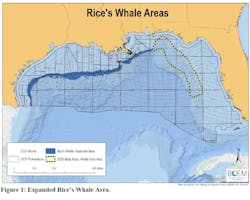Biden administration looks to impose new restrictions on Gulf of Mexico work
The Biden administration has negotiated a deal in court with environmental groups that would involve the administration developing new restraints on Gulf of Mexico oil and gas work to protect Rice’s whales, an endangered species.
The substance of the agreement includes speed restrictions for ships that would be recommended for existing oil and gas operations and mandatory for leaseholders starting with oil and gas Lease Sale 261, scheduled for Sept. 27.
The agreement would also limit the location of lease sales, avoiding sale of blocks in a long strip from the northeastern part of the Gulf all the way to the Mexican border, a strip limited to areas with water depths of 100-400 m, as delineated on isobath maps, plus an additional 10 km around the strip. That strip is also where the speed restrictions would apply.
The deal was filed July 21 in the US District Court for Maryland as a stipulated agreement to stay the litigation, in Sierra Club v. National Marine Fisheries Service (NMFS).
Its proposed restrictions, if adopted, would remain in place for at least as long as it takes for the Bureau of Ocean Energy Management (BOEM) and the Bureau of Safety and Environmental Enforcement (BSEE) to complete a consultation with NMFS on Endangered Species Act considerations. Depending on the outcome of that consultation, the restrictions could be modified or extended indefinitely.
BOEM and BSEE are to provide their “consultation package” to NMFS by Sept. 1. NMFS agrees to conclude the consultation within 1 year, though it also notes the possibility of needing an extension of time for the consultation.
Rice’s whales are year-round inhabitants of the northeastern Gulf of Mexico, but one new study has indicated the whales may be found in the long strip of waters that are 100-400 m in depth. The Biden administration is taking that study as a guide for its proposed restrictions to protect Rice’s whales.
The restrictions include a BOEM recommendation—not phrased as a mandate—that all vessels associated with oil and gas work respect a year-round speed limit of 10 knots when sailing through the expanded whale territory. BOEM also will include the speed limit as a lease stipulation for Lease Sale 261 and subsequent new leases at least for as long as the consultation with NMFS continues.
Frustration in industry
The American Petroleum Institute, the National Ocean Industries Association, and the geophysical contractors group EnerGeo Alliance issued a joint statement deploring the deal.
“This private settlement agreement between the federal government and environmental activists places unfounded restrictions on operations in the US Gulf of Mexico that severely hamper America’s ability to produce energy,” the three trade groups said. They argued the deal amounts to “a far-reaching ban on operations.”
Several aspects of the deal appear to bother industry, including a greatly expanded area of protection for Rice’s whales based on one study that has not yet been corroborated.
The Biden administration says in one of its court documents that the possibility of accidental harm (“incidental take,” in Endangered Species Act jargon) to Rice’s whales in the expanded area “cannot be dismissed at this time.” But then it adds that this does not mean BOEM “has determined that there is a ‘reason to believe’ that incidental take may occur.”
The 10-knot speed limit in the expanded whale territory can be expected to have an impact on the economics of leases, though how severe that impact might be remains to be seen.
Another frustration for the oil and gas industry may be that it is the only industry being singled out for the Gulf of Mexico speed limits in the expanded Rice’s whale territory.
If NMFS concludes the consultation with a determination that the speed limits are needed indefinitely in the expanded territory, that may be a harbinger of things to come for other industries. On the Atlantic Coast, NMFS has established seasonal speed limits in some areas for large ships of all industries to protect the endangered right whale, and last year the service proposed expanding those restrictions.
About the Author
Alan Kovski
Washington Correspondent
Alan Kovski worked as OGJ's Washington Correspondent from 2019 through 2023.
